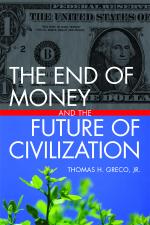(this article was first published in September 2009. It has been revised and updated in March 2010)

Large parts of our economy appear set to go belly-up. The banking system, which should be of service to the productive economy, is itself on the verge of collapse. Speculators who brought those banks to the brink by pushing "creative" investment opportunities are being lavishly rewarded with bail-out funds amounting to huge gifts that are ultimately being financed by the tax payers.
Unless we want to spend the rest of our lives working to pay off those huge government debts being incurred to keep banks afloat, we should try to understand what exactly has been happening - where things went wrong. And we should learn how money and banking can be re-configured to support, rather than ruin, real economic efforts.
This can't be left to corrupt politicians. We can't even rely on the economists. They are part of the problem. Not only did they not warn us of impending disaster, they were the ones who convinced government that loose rules in banking were good for the economy.
The only way out of this mess is to understand for ourselves. Thomas Greco's new work The End of Money and the Future of Civilization is an encouraging book in this respect. Amongst all the confusion, it provides a stable foothold, a starting point for this quest to understand the subjects of economy and money.
Greco reduces the complicated stuff down to the very essentials. After providing an overview of historical developments and an indication of the reasons for our current trouble, the book points to a future where currency may be at the service of actual economic activities, rather than being a source of easy profit for bankers and speculators, those who have been gambling with our savings and our mortgages.
No comments:
Post a Comment